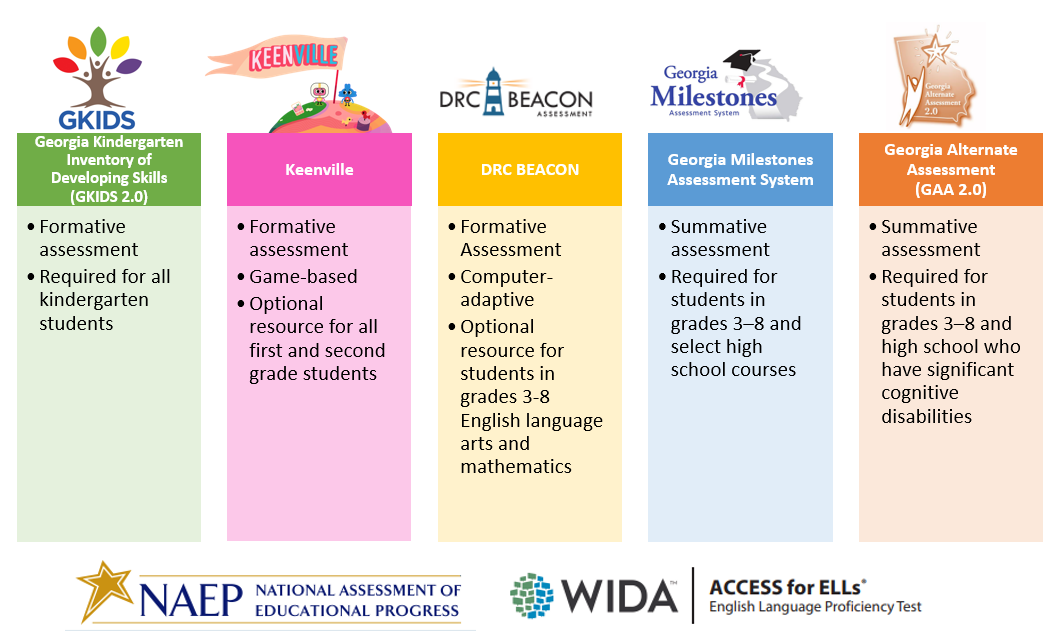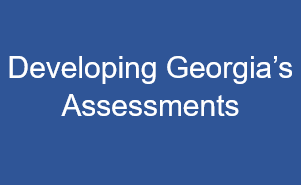Educational assessments are designed to serve specific purposes. Georgia’s assessments can be classified in terms of the primary purposes that they intend to serve: formative or summative. Georgia's balanced approach to assessment is designed to providel insight on how Georgia's students are doing while also focusing time and resources on improving student learning at the classroom level during the school year. Summative
assessments provide an opportunity for students to demonstrate achievement at
the end of the school year, while formative assessments used throughout the
school year provide educators with timely information on student progress to
inform immediate instructional choices. Georgia assessments are standards-referenced tests, meaning Georgia student performance is compared to the expectations inherent in the aligned standards. As
such, assessment at the end of the school year is designed to directly relate
to what students learn throughout the year: Georgia assessments measure the
same grade-level academic content that students learned throughout the year,
using methods designed to reflect the way students demonstrate knowledge,
skills, and abilities within the classroom. Any student can achieve any score, and students are not ranked against each other. Understanding Georgia assessments begins with understanding the content standards to which they are aligned.
Development of Georgia Assessments
The processes for developing Georgia assessments use industry-recognized standards as codified in the Standards for Educational and Psychological Measurement (2014) and follow well-documented and transparent procedures to ensure that the assessments are of high quality and are useful for their intended purposes. The GaDOE contracts with testing vendors for the development, administration, scoring, and reporting of the assessments, and the Assessment staff of GaDOE provides direct oversight of this work.
Georgia educators participate in nearly every step of the development cycle, and they make significant contributions to the assessment program. Across each assessment that is developed specifically for Georgia students, educators establish and prioritize content specifications (what academic content will go on the assessment). Other development tasks that involve educators include review of achievement level descriptors (what students know and can do at each achievement level), assessment questions, and supplemental resources to support teachers and students. Georgia educators furthermore engage in rangefinding to evaluate and score student writing samples that will consequently be used to train readers on how to score student submissions to constructed-response items.
Learn More: Georgia's Test Development Process
An interactive video and infographic series is available on the GaDOE website with further information on Georgia's test development process, including how custom assessments are build specifically for Georgia students. Click
here to learn more!

The Georgia K-12 Academic Content Standards specify what students are expected to know and be able to do in each grade and content area/course. Georgia Milestones, Georgia Alternate Assessment 2.0 (GAA 2.0), Keenville, Georgia Kindergarten Inventory of Developing Skills 2.0 (GKIDS 2.0) and GKIDS Readiness Check are developed specifically for Georgia students and owned by the State of Georgia, so there is a direct match between the content of the assessments (what the assessment questions ask students about) and the state-adopted content standards. DRC BEACON, a through-year formative assessment, is likewise mapped to the GSE and is provided free to all Georgia public school districts/schools as an optional resource. The alignment of Georgia's assessment system to one system of standards developed by and for Georgia is critical to a cohesive and balanced approach to assessment.
Georgia's Extended Content Standards (ECS) are extensions of the GSE and reflect how a grade-level standard can be made accessible for students with significant cognitive disabilities for both instruction and assessment. Through such extensions, skills that align are derived (or “extended") from the grade level standard. Each extension is an entry point that demonstrates how educators can teach standard-based skills that are both appropriate for the student with disabilities and allow the student to move toward higher levels of learning within the standard. The ECS are separated into four access points, Levels are included within the ECS to show the progression of complexity of skills aligned to the standard. GAA 2.0 tasks are aligned to these levels.
The WIDA English Language Development (ELD) Standards Framework provides a foundation for curriculum, instruction and assessment for multilingual learners in kindergarten through grade 12. ACCESS for ELLs and Alternate ACCESS for ELLs are English language proficiency assessments aligned to the WIDA ELD Standards Framework. These assessments are designed to measure English learners' social and academic language proficiency of English reading, writing, speaking, and listening.
Commonly known as “The Nation's Report Card,'' the National Assessment of Educational Progress (NAEP) is a congressionally-mandated project of the U.S. Department of Education's National Center for Education Statistics (NCES) designed to broadly monitor educational progress across the nation. NAEP assessment is based on an organizing framework which describes what students should know and be able to do in that NAEP content area. The National Assessment Governing Board develops the NAEP frameworks for assessments in each subject.
Spotlight On: Educator Voices
Georgia educators are involved in every step of the test development process. Following development meetings, they shared their thoughts:
- "I will never look at creating assessments the same again. The committee that I was on did a thorough and consistent job of analyzing and determining solutions while making all voices heard with equity. I think our combinations of background and experiences is what really did the trick. This was truly the best educational growth experience I have had in quite some time."
- "I really appreciate that the process includes teachers who work directly with the students who are taking the assessment. I feel like our opinions/input are valued and the experience was very rewarding! Thank you for allowing me to be a part of the process."
- “Participating
in rangefinding is, perhaps, the best professional development an English
teacher can complete. Looking at real-life student writing samples, scoring
them on the rubric, and discussing why the score was given calibrates teacher
scoring and creates a clear message of what quality of writing defines each
level of the rubric.”

.png)

